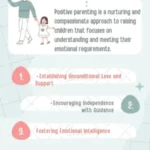Positive parenting is a comprehensive strategy that allows parents to nurture their children’s emotional and psychological well-being while creating strong and loving parent-child interactions. At positiveparentingideas.com, we are devoted to providing you with essential insights on positive parenting strategies that will help you raise well-adjusted and emotionally healthy children.
The Essence of Positive Parenting: The 3 F’s
Positive parenting may be condensed into three essential concepts, generally referred to as the 3 F’s. These principles operate as a guide for parents, leading them towards providing a loving and supportive environment for their children. Let’s look into each of these key components:

1. Firmness
Firmness in good parenting does not correlate to strictness or harshness. Instead, it stresses the significance of creating clear limits and age-appropriate guidelines for children. These limits establish a secure and organized atmosphere where children may learn responsibility and comprehend the consequences of their behavior. Firmness in good parenting implies being consistent in maintaining these limits, giving children with a feeling of stability and predictability.
Firmness in positive parenting is a delicate balance between setting boundaries and maintaining a nurturing environment. It does not advocate for strictness or harsh discipline but emphasizes the importance of clear limits and age-appropriate guidelines for children. These boundaries provide a structured and secure atmosphere where children can learn responsibility and comprehend the consequences of their actions. Firmness involves consistent enforcement of these limits, creating a sense of stability and predictability crucial for a child’s emotional development.
Parents practicing firmness set clear expectations for their children. Through effective communication, they articulate rules that are suitable for the child’s age and developmental stage. This clarity helps children understand what is expected of them, fostering a sense of security within defined boundaries.
2. Fairness
Fairness is a cornerstone of healthy parenting. It means treating each kid fairly and justly, taking into consideration their particular needs and qualities. Fairness implies avoiding partiality and ensuring that penalties for conduct are consistent and suitable for each child’s age and knowledge. By being fair, parents create trust and build good parent-child relationships based on respect and equality.
Fairness in positive parenting is the cornerstone of creating a nurturing environment where each child is treated equitably, considering their unique needs and qualities. It involves avoiding favoritism and ensuring that consequences for behavior are consistent and appropriate for each child’s age and understanding.
Parents practicing fairness recognize and celebrate the individuality of each child. This involves understanding and appreciating their distinct qualities, strengths, and challenges. By acknowledging the unique attributes of each child, parents create an environment where children feel valued and understood, fostering a positive parent-child relationship.
Equal treatment is a fundamental principle of fairness. This means eliminating prejudice or bias and ensuring that rules and consequences apply consistently to all children in the family. Fair parenting involves being vigilant against any form of discrimination, creating an atmosphere of trust and respect.
3. Friendship
Positive parenting promotes parents to be nice and accessible characters in their children’s life. Being a friend to your kid entails creating a deep emotional relationship based on trust, love, and open communication. It requires carefully listening to your child’s ideas and emotions, giving support, and being empathic. By creating a relationship with your kid, you create an atmosphere where they feel comfortable discussing their issues, asking help, and building a deep link with you.
Friendship in positive parenting is a unique aspect that encourages parents to be approachable and understanding figures in their children’s lives. It involves creating a deep emotional connection based on trust, love, and open communication. Unlike a traditional authoritarian approach, positive parenting with a friendly tone aims to build a relationship where children feel comfortable sharing their thoughts, emotions, and concerns.
Active listening is a fundamental component of friendship in positive parenting. Parents take the time to listen intently to their child’s ideas and feelings without interruption. This active listening communicates to the child that their opinions are valued and respected, fostering a sense of being heard and understood.
Empathetic responses further enhance the friendship dynamic. Parents show empathy by acknowledging and understanding their child’s emotions, providing comfort and support when needed. This empathetic approach helps children feel secure in expressing their feelings, contributing to a positive and trusting parent-child relationship.
Implementing the 3 F’s in Practice
Firmness
- Setting Clear Expectations: Clearly clarify rules and expectations that are age-appropriate for your kid.
- Consistent Enforcement: Enforce sanctions consistently and equitably when rules are not followed.
- Predictable Routine: Create a daily routine that gives structure and predictability for your youngster.
Fairness
- Equal Treatment: Treat all your children equitably, eliminating prejudice or bias.
- Age-Appropriate Consequences: Ensure that consequences for conduct are adequate for each child’s age and comprehension.
- Open Dialogue: Encourage open and honest conversation, enabling youngsters to voice their concerns openly.
Friendship
- Active Listening: Take the time to listen intently to your child’s ideas and feelings without interruption.
- Empathetic Responses: Show empathy by noticing your child’s emotions and giving comfort when required.
- Quality Time: Spend quality time with your kid, participating in things they like.
The Impact of the 3 F’s in Positive Parenting
Implementing the principles of Firmness, Fairness, and Friendship, commonly known as the 3 F’s, in positive parenting exerts a profound impact on a child’s development. Ongoing research underscores that cultivating a parenting approach that blends firm boundaries, fairness in discipline, and a friendly connection yields significant benefits. Children raised in this nurturing environment tend to exhibit enhanced behavior, improved emotional regulation, and overall well-being. Moreover, they are predisposed to develop robust self-esteem and establish healthier relationships as they navigate through life. The integration of the 3 F’s in parenting not only shapes a child’s present but also lays a foundation for their future social and emotional competence, fostering a positive trajectory for their overall growth and fulfillment.
Frequently Asked Questions (FAQs):
- What is Positive Parenting, and how does it differ from traditional parenting?
Positive parenting is a comprehensive strategy focused on nurturing children’s emotional and psychological well-being while fostering strong parent-child bonds. It differs from traditional parenting by emphasizing the 3 F’s—Firmness, Fairness, and Friendship—creating a supportive environment based on clear limits, equitable treatment, and deep emotional connections.
- How can Firmness in parenting be balanced without being overly strict?
Firmness in positive parenting involves setting clear, age-appropriate limits and guidelines. It is not about strictness but maintaining a nurturing environment. Parents communicate expectations through effective communication, fostering stability and predictability crucial for a child’s emotional development.
- Why is Fairness considered a cornerstone of healthy parenting?
Fairness ensures equitable treatment, considering each child’s unique needs and qualities. It avoids favoritism and establishes consistent consequences suitable for each child’s age and understanding. Fair parenting builds trust, respect, and positive parent-child relationships.
- How does Friendship play a role in positive parenting, and is it different from traditional authoritarian approaches?
Friendship in positive parenting encourages parents to be approachable and understanding. It involves creating deep emotional connections, active listening, and empathy. Unlike traditional authoritarian approaches, it fosters an open environment where children feel comfortable sharing thoughts and concerns.
- What practical steps can parents take to implement the 3 F’s—Firmness, Fairness, and Friendship?
Parents can implement Firmness by setting clear expectations and enforcing sanctions consistently. Fairness involves treating all children equitably and ensuring age-appropriate consequences. Friendship includes active listening, empathetic responses, and spending quality time with children, fostering a positive parent-child relationship.
In Conclusion
In conclusion, The 3 F’s—Firmness, Fairness, and Friendship—comprise the core principles that guide parents toward creating a loving and supportive environment. Firmness emphasizes clear limits, Fairness ensures equitable treatment, and Friendship encourages deep emotional connections. Implementing these principles involves setting expectations, being consistent, and fostering open dialogue. Research consistently highlights the profound impact of such positive parenting approaches, leading to improved behavior, emotional regulation, and overall well-being in children. By embracing the 3 F’s, parents lay the groundwork for their children’s present and future, nurturing social and emotional competence for a positive and fulfilling life journey.





